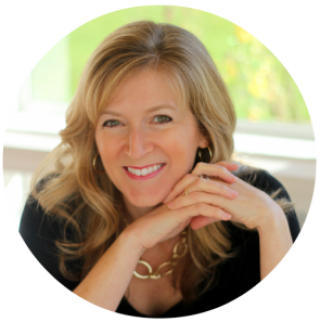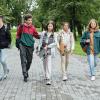Photo:
Students of the Burnett Center strike a pose at Seattle Center. Photo credit: Burnett Center
The day Yon van Marle turned 21, his family celebrated with mini-golf, laser tag and go karts. But an unspoken question hung in the air: What next?
Van Marle has autism, and like many parents of a child with special needs, his parents weren’t sure what lay ahead for their son. Once van Marle aged out of the public education system at age 21, opportunities to connect with peers, get a job or live independently seemed out of reach.
But van Marle knew what he wanted — to make friends, grow more confident and become more independent.
The first step: Move from his family’s home in rural Montana to a city with more opportunities for a young man with special needs. So, in November 2014, less than three weeks after meeting the staff at the Seattle Children’s Alyssa Burnett Adult Life Center (ABC), van Marle and his mother, Pam, moved to Seattle, while his father, Bob, remained in Montana for work.
Life at ABC
The Alyssa Burnett Center is, as the name hints, a life-long learning center for young adults with disabilities. The idea came from Charlie and Barbara Burnett, whose adult daughter, Alyssa, has autism.
Charlie Burnett, who died in June, is known for both for his philanthropy and work in the pharmacy industry (he developed the pharmacy division of Costco). He and wife Barbara also founded Tessera, a nonprofit that supports people with autism and other developmental disabilities. Tessera partnered with Seattle Children’s Hospital in 2014 to form ABC.
The center opened its doors in Bothell to eight students. Today, ABC serves more than 100 students and offers 36 classes in addition to one-time events and outings. Fees can be paid out-of-pocket, by DDA (Developmental Disabilities Administration) respite hours or through scholarships offered by the center.
We’re able to accommodate adults of all ability levels.
“We’re able to accommodate adults of all ability levels, including challenging behaviors,” says Tammy Mitchel, the program manager at ABC. “We spend time up front assessing the skills, desires and needs of each student, allowing us to place them where they’ll be successful.”
Van Marle's first class at ABC was a social skills class where he practiced the art of conversation with his classmates. He learned how to stay on topic and appreciate the importance of small talk, and by the next quarter was eager to take other classes including art, Zumba and cooking.
Classes and events at ABC continually change based on the desires of students, staff and parents. When students asked about gaming, the center began offering a class where students could play board and video games while honing social skills. Seeing a need for peer mentors, ABC partnered with students from the University of Washington, Bothell, to create a mentoring program. From those successes came other unexpected opportunities.
“Our staff came up with the idea of exposing our adults to the community, volunteering and serving in a purposeful way,” Mitchel explains. “And the community has responded in kind.”
Take the ABC students who regularly visit a local senior center. The students gain confidence in an unfamiliar social situation, while the visits are a weekly highlight for many of the seniors. Or consider how this spring, Microsoft’s Xbox division piloted an inclusion-friendly gaming experience for tech-savvy students at ABC. In turn, the students provided Microsoft with ideas on how they could create a more welcoming gaming experience for people of all ability levels.
Less than three years after joining ABC, van Marle was ready for his next milestone. To recognize his work and this of his fellow ABC students, the staff planned a formal dance — a request from students and families alike. And so, in May, ABC hosted its first Spring Fling in partnership with the Tavon Center, Bellevue Highland Center and Bridge of Promise.
Van Marle had so much fun, he rarely left the dance floor. “It was really cool!” he says of the event.
Now, van Marle works as a support service clerk in Seattle — his first job. He’s learned how to ride the bus, has joined a Special Olympics team and, he says, feels more confident than ever.
The author shares her experienceIn our October 2017 issue, Kristin Jarvis Adams shares her experience as the parent of a son with special needs. |











